Note
I want to live by myself when I move out of my parent's place but I'm really afraid of money problems? I'm afraid that the only place I can afford will be in the ghetto and it'll all be torn apart and I'll only be allowed to eat one granola bar a week. I'm really stressing out about this. I don't know anything about after school life. I don't know anything about paying bills or how to buy an apartment and it's really scaring me. is there anything you know that can help me?
HI darling,
I’ve actually got a super wonderful masterpost for you to check out:
Home
what the hell is a mortgage?
first apartment essentials checklist
how to care for cacti and succulents
the care and keeping of plants
Getting an apartment
Money
earn rewards by taking polls
how to coupon
what to do when you can’t pay your bills
see if you’re paying too much for your cell phone bill
how to save money
How to Balance a Check Book
How to do Your Own Taxes
Health
how to take care of yourself when you’re sick
things to bring to a doctor’s appointment
how to get free therapy
what to expect from your first gynecologist appointment
how to make a doctor’s appointment
how to pick a health insurance plan
how to avoid a hangover
a list of stress relievers
how to remove a splinter
Emergency
what to do if you get pulled over by a cop
a list of hotlines in a crisis
things to keep in your car in case of an emergency
how to do the heimlich maneuver
Job
time management
create a resume
find the right career
how to pick a major
how to avoid a hangover
how to interview for a job
how to stop procrastinating
How to write cover letters
Travel
ULTIMATE PACKING LIST
Traveling for Cheap
Travel Accessories
The Best Way to Pack a Suitcase
How To Read A Map
How to Apply For A Passport
How to Make A Travel Budget
Better You
read the news
leave your childhood traumas behind
how to quit smoking
how to knit
how to stop biting your nails
how to stop procrastinating
how to stop skipping breakfast
how to stop micromanaging
how to stop avoiding asking for help
how to stop swearing constantly
how to stop being a pushover
learn another language
how to improve your self-esteem
how to sew
learn how to embroider
how to love yourself
100 tips for life
Apartments/Houses/Moving
Moving Out and Getting an Apartment, Part 1: Are You Sure? (The Responsible One)
Moving Out and Getting an Apartment, Part 2: Finding the Damn Apartment (The Responsible One)
Moving Out and Getting an Apartment, Part 3: Questions to Ask about the Damn Apartment (The Responsible One)
Moving Out and Getting an Apartment, Part 4: Packing and Moving All of Your Shit (The Responsible One)
How to Protect Your Home Against Break-Ins (The Responsible One)
Education
How to Find a Fucking College (The Sudden Adult)
How to Find Some Fucking Money for College (The Sudden Adult)
What to Do When You Can’t Afford Your #1 Post-Secondary School (The Sudden Adult)
Stop Shitting on Community College Kids (Why Community College is Fucking Awesome) (The Responsible One)
How to Ask for a Recommendation Letter (The Responsible One)
How to Choose a College Major (The Sudden Adult)
Finances
How to Write a Goddamn Check (The Responsible One)
How to Convince Credit Companies You’re Not a Worthless Bag of Shit (The Responsible One)
Debit vs Credit (The Responsible One)
What to Do if Your Wallet is Stolen/Lost (The Sudden Adult)
Budgeting 101 (The Responsible One)
Important Tax Links to Know (The Responsible One)
How to Choose a Bank Without Screwing Yourself (The Responsible One)
Job Hunting
How to Write a Resume Like a Boss (The Responsible One)
How to Write a Cover Letter Someone Will Actually Read (The Responsible One)
How to Handle a Phone Interview without Fucking Up (The Responsible One)
10 Sites to Start Your Job Search (The Responsible One)
Life Skills
Staying in Touch with Friends/Family (The Sudden Adult)
Bar Etiquette (The Sudden Adult)
What to Do After a Car Accident (The Sudden Adult)
Grow Up and Buy Your Own Groceries (The Responsible One)
How to Survive Plane Trips (The Sudden Adult)
How to Make a List of Goals (The Responsible One)
How to Stop Whining and Make a Damn Appointment (The Responsible One)
Miscellaneous
What to Expect from the Hell that is Jury Duty (The Responsible One)
Relationships
Marriage: What the Fuck Does It Mean and How the Hell Do I Know When I’m Ready? (Guest post - The Northwest Adult)
How Fucked Are You for Moving In with Your Significant Other: An Interview with an Actual Real-Life Couple Living Together™ (mintypineapple and catastrofries)
Travel & Vehicles
How to Winterize Your Piece of Shit Vehicle (The Responsible One)
How to Make Public Transportation Your Bitch (The Responsible One)
Other Blog Features
Apps for Asshats
Harsh Truths & Bitter Reminders
Asks I’ll Probably Need to Refer People to Later
Apartments (or Life Skills) - How Not to Live in Filth (The Sudden Adult)
Finances - Tax Basics (The Responsible One)
Important Documents - How to Get a Copy of Your Birth Certificate (The Responsible One)
Important Documents - How to Get a Replacement ID (The Responsible One)
Health - How to Deal with a Chemical Burn (The Responsible One)
Job Hunting - List of Jobs Based on Social Interaction Levels (The Sudden Adult)
Job Hunting - How to Avoid Falling into a Pit of Despair While Job Hunting (The Responsible One)
Job Hunting - Questions to Ask in an Interview (The Responsible One)
Life Skills - First-Time Flying Tips (The Sudden Adult)
Life Skills - How to Ask a Good Question (The Responsible One)
Life Skills - Reasons to Take a Foreign Language (The Responsible One)
Life Skills - Opening a Bar Tab (The Sudden Adult)
Relationships - Long Distance Relationships: How to Stay in Contact (The Responsible One)
Adult Cheat Sheet:
what to do if your pet gets lost
removing stains from your carpet
how to know if you’re eligible for food stamps
throwing a dinner party
i’m pregnant, now what?
first aid tools to keep in your house
how to keep a clean kitchen
learning how to become independent from your parents
job interview tips
opening your first bank account
what to do if you lose your wallet
tips for cheap furniture
easy ways to cut your spending
selecting the right tires for your car
taking out your first loan
picking out the right credit card
how to get out of parking tickets
how to fix a leaky faucet
get all of your news in one place
getting rid of mice & rats in your house
when to go to the e.r.
buying your first home
how to buy your first stocks
guide to brewing coffee
first apartment essentials checklist
coping with a job you hate
30 books to read before you’re 30
what’s the deal with retirement?
difference between insurances
Once you’ve looked over all those cool links, I have some general advice for you on how you can have some sort of support system going for you:
Reasons to move out of home
You may decide to leave home for many different reasons, including:
wishing to live independently
location difficulties – for example, the need to move closer to university
conflict with your parents
being asked to leave by your parents.
Issues to consider when moving out of home
It’s common to be a little unsure when you make a decision like leaving home. You may choose to move, but find that you face problems you didn’t anticipate, such as:
Unreadiness – you may find you are not quite ready to handle all the responsibilities.
Money worries – bills including rent, utilities like gas and electricity and the cost of groceries may catch you by surprise, especially if you are used to your parents providing for everything. Debt may become an issue.
Flatmate problems – issues such as paying bills on time, sharing housework equally, friends who never pay board, but stay anyway, and lifestyle incompatibilities (such as a non-drug-user flatting with a drug user) may result in hostilities and arguments.
Your parents may be worried
Think about how your parents may be feeling and talk with them if they are worried about you. Most parents want their children to be happy and independent, but they might be concerned about a lot of different things. For example:
They may worry that you are not ready.
They may be sad because they will miss you.
They may think you shouldn’t leave home until you are married or have bought a house.
They may be concerned about the people you have chosen to live with.
Reassure your parents that you will keep in touch and visit regularly. Try to leave on a positive note. Hopefully, they are happy about your plans and support your decision.
Tips for a successful move
Tips include:
Don’t make a rash decision – consider the situation carefully. Are you ready to live independently? Do you make enough money to support yourself? Are you moving out for the right reasons?
Draw up a realistic budget – don’t forget to include ‘hidden’ expenses such as the property’s security deposit or bond (usually four weeks’ rent), connection fees for utilities, and home and contents insurance.
Communicate – avoid misunderstandings, hostilities and arguments by talking openly and respectfully about your concerns with flatmates and parents. Make sure you’re open to their point of view too – getting along is a two-way street.
Keep in touch – talk to your parents about regular home visits: for example, having Sunday night dinner together every week.
Work out acceptable behaviour – if your parents don’t like your flatmate(s), find out why. It is usually the behaviour rather than the person that causes offence (for example, swearing or smoking). Out of respect for your parents, ask your flatmate(s) to be on their best behaviour when your parents visit and do the same for them.
Ask for help – if things are becoming difficult, don’t be too proud to ask your parents for help. They have a lot of life experience.
If your family home does not provide support
Not everyone who leaves home can return home or ask their parents for help in times of trouble. If you have been thrown out of home or left home to escape abuse or conflict, you may be too young or unprepared to cope.
If you are a fostered child, you will have to leave the state-care system when you turn 18, but you may not be ready to make the sudden transition to independence.
If you need support, help is available from a range of community and government organisations. Assistance includes emergency accommodation and food vouchers. If you can’t call your parents or foster parents, call one of the associations below for information, advice and assistance.
Where to get help
Your doctor
Kids Helpline Tel. 1800 55 1800
Lifeline Tel. 13 11 44
Home Ground Services Tel. 1800 048 325
Relationships Australia Tel. 1300 364 277
Centrelink Crisis or Special Help Tel. 13 28 50
Tenants Union of Victoria Tel. (03) 9416 2577
Things to remember
Try to solve any problems before you leave home. Don’t leave because of a fight or other family difficulty if you can possibly avoid it.
Draw up a realistic budget that includes ‘hidden’ expenses, such as bond, connection fees for utilities, and home and contents insurance.
Remember that you can get help from a range of community and government organizations.
(source)
Keep me updated? xx
152K notes
·
View notes
Photo
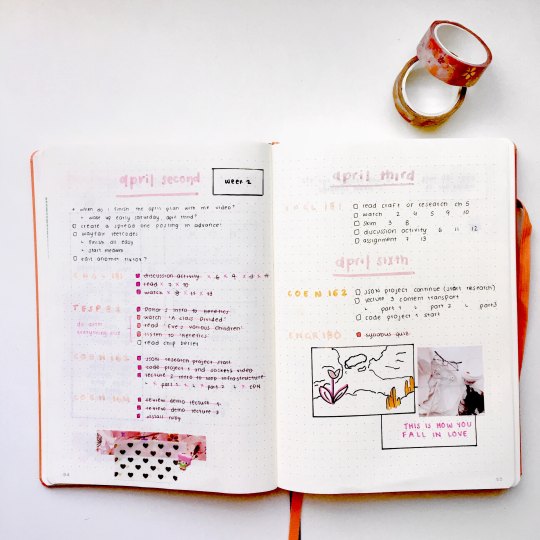
ahhh i got some exciting news today and i’m going to start being a web designer :”)))
| 210409
236 notes
·
View notes
Text
I definitely feel like there should have been an emotional warning with this episode.
12 notes
·
View notes
Text
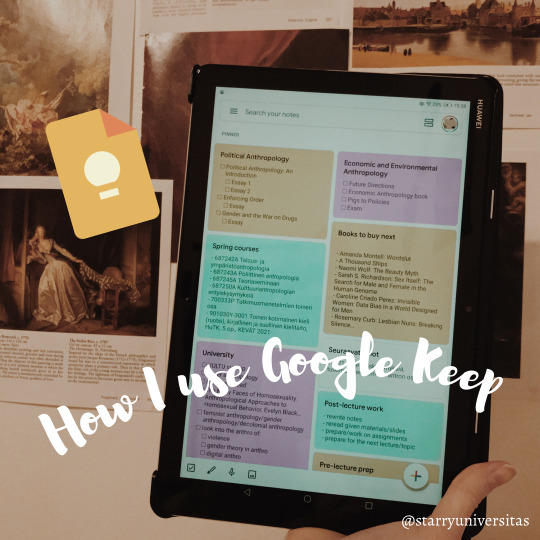
— 28.1.2021 💡 studygram
In addition to Notion I find that Google Keep is a really useful tool for organizing my life and studies!! I especially like its synchronization between devices because I don’t use all android or all apple products so this helps a lot. You can also use it next to Google Calendar for easier planning
I use it as a kind of a brain dump/digital post it note, where I create a note when I have something I need to remember that I will expand later
—> stuff you can do:
- regular text notes
- tickboxes for to do lists
- handwritten notes
- images
- voice notes
- set alarms for any note
Examples of notes I have are books I want to read, subject specific to-do lists, google calendar color coding key, reading journal and studygram/studyblr ideas
146 notes
·
View notes
Text
One of my favorite linguistic phenomena is rebracketing, which is when a word or words is/are redivided differently, either two words becoming one, one word heard as two, or part of one word interpreted as part of the other. This frequently happens with articles, for example:
apron was originally napron, but “a napron” was interpreted as “an apron”
newt comes from ewt by the same process
In the opposite direction, nickname comes from Middle English nekename which in turn came from ekename (an ekename -> a nekename) where “eke” was an old word meaning “also” or “additional” (so basically “an additional name”)
ammunition comes from an obsolete dialectal French amunition, which came from munition, the phrase la munition being heard as l’amunition.
the nickname Ned comes from Ed, via “mine Ed” being heard as “my Ned” (in archaic English, “my” and “mine” had the same relationship as “a” and “an”), same with several other nicknames like Nell
The word “orange” ulimately derives from the Arabic nāranj, via French “orange”, the n being lost via a similar process involving the indefinite article, e.g., something like French “une norange” becoming “une orange” (it’s unclear which specific Romance language it first happened in)
in the Southern US at least (not sure about elsewhere), “another” is often analyzed as “a nother”, hence the phrase “a whole nother”
omelet has a whole series of interesting changes; it comes from French omelette, earlier alemette (swapping around the /l/ and /m/), from alemelle from an earlier lemelle (la lemelle -> l’alemelle)
Related to this, sometimes two words, especially when borrowed into another language, will be taken as one. Numerous words were borrowed from Arabic with the definite article al- attached to them. Spanish el lagarto became English alligator. An interesting twist is admiral, earlier amiral (the d probably got in there from the influence of words like “administer”) from Arabic amir al- (lord of the ___), particularly the phrase amir al-bahr, literally “lord of the sea”.
Sometimes the opposite happens. A foreign word will look like two words, or like a word with an affix. For example, the Arabic kitaab (book) was borrowed into Swahili as kitabu. ki- happens to be the singular form of one of the Swahili genders, and so it was interpreted as ki-tabu. To form the plural of that gender, you replace ki- with vi-, thus, “books” in Swahili is vitabu. The Greek name Alexander became, in Arabic, Iskander, with the initial al- heard as the article al-.
Similarly, the English word Cherry came from Old Norman French cherise, with the s on the end interpreted as the plural -s. Interestingly enough, that word came from Vulgar Latin ceresia, a feminine singular noun, but originally the plural of the neuter noun ceresium! So a Latin plural was reinterpreted as a singular in Vulgar Latin, which in turn was interpreted as a plural when borrowed into English!
The English suffix -burger used with various foods (e.g., cheeseburger, or more informally chickenburger, etc.) was misanlyzed from Hamburger as Ham-burger, itself from the city of Hamburg
This can happen even with native words. Modern French once is used for the snow leopard, but originally meant “lynx”. In Old French, it was lonce (ultimately from the same source as lynx), which was reinterpreted as l’once! In English, the word “pea” was originally “pease”, but that looked like it had the plural -s on it, and so the word “pea” was created from it. Likewise, the adjective lone came from alone, heard as “a lone”, but alone itself came originally from all one.
55K notes
·
View notes
Text
how i use notion!
ai spent so long on setting up notion for 2021 but i’m satisfied and i think i found something that finally works for me - remember that when it comes to productivity it’s up to you to find what works and what doesn’t, i started using notion almost a year ago and until now never found a set up that worked for me.
let me know if you’re interested in using this template and I will find a way to share it with you!
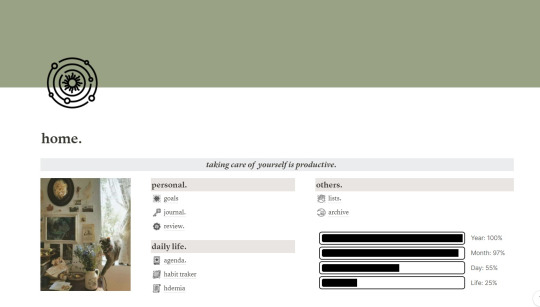
home
i use this just to have all of my pages accessible when i open up notion - i also put everything under a category to make it easier to access during the day.

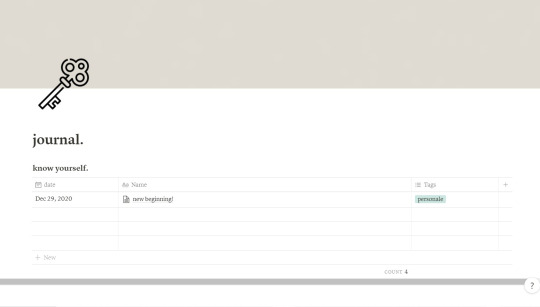
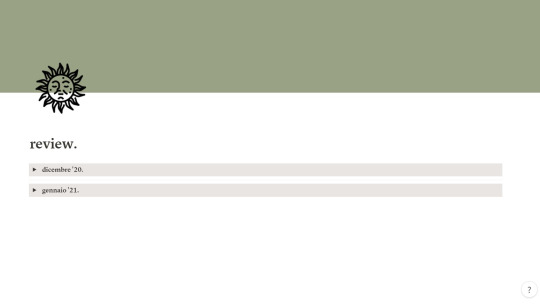
goals, journal, review
goals - i use this page to track my long term goals, both divided in personal and school related.
journal - i use this page as my personal journal, a brain dump, a place to collect ideas, i also made some tags to categorize if i’m talking about something personal, school or if it’s an idea or a dream.
review - since the journal is something more specific for the day, i like to keep track how my month went.
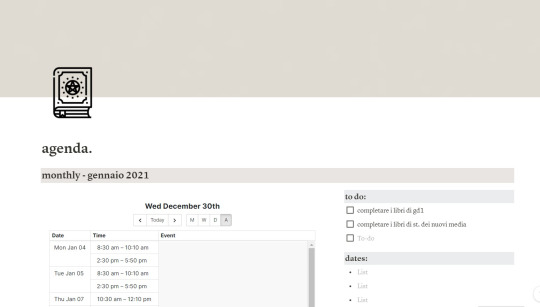
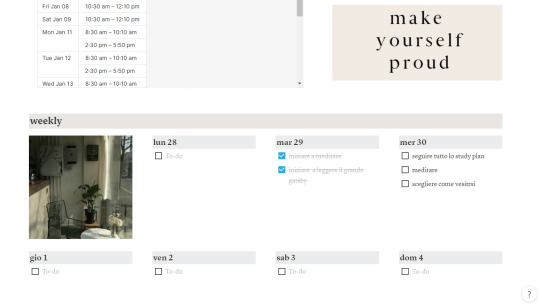
agenda.
here i have my monthly agenda, with goals and dates to remember - also i used a widget that connects to my google calendar so i can see what’s next and what i have to do. beneath i have my weekly agenda that i use to keep track of the task that i have to do daily.
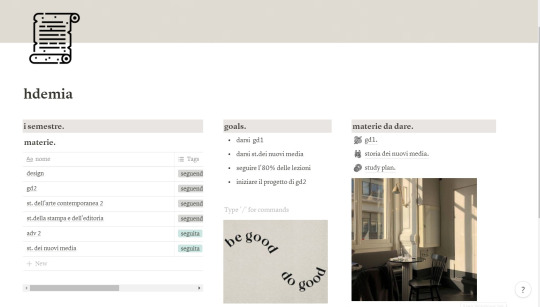

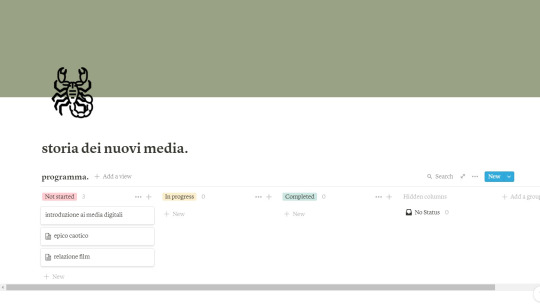

hdemia, subjects, study plan.
hdemia - this my main academic page where i keep track of the subjects i’m taking this semester, the goals for this semester and the subjects i’m actually preparing.
subjects - this is a pretty easy set up i just keep track of the things that i have to do and i mark them as completed, in progress, not started
study plan - here is a calendar where i use sub pages to write what i want to accomplish in that specific date.
the other pages are just a simple habit traker and a list of movies, books and things i want to watch/read/buy.
always sorry for the bad english - i hope everything was clear!
inspired by @acadhr
579 notes
·
View notes
Text
hobbies masterpost!
a really excellent way to reduce anxiety is to pick up a new hobby. find something you’re interested in, learn it, then use it as a healthy and productive way to cope.
learn to play guitar
learn how to make interactive stories with the free program Twine
learn how to make pixel art
learn another language
learn how to build a ship in a bottle
learn how to develop your own film
learn how to embroider
learn how to make chiptunes (8-bit music)
learn how to make origami (the art of paper folding)
learn how to make tumblr themes
learn how to make jewelry
learn how to make candy
learn how to make terrariums
learn how to make your own perfume
learn how to make your own tea
learn how to build birdhouses
learn how to read tarot cards
learn how to make zines
learn how to code
learn how to whittle (wood carving)
learn how to make candles
learn how to make clay figurines
learn how to knit scarves
learn how to become an amateur astronomer
learn some yoyo tricks
learn how to start a collection
learn how to start body building
learn how to edit wikipedia articles
learn how to decorate iphone cases
learn how to do freelance writing
learn how to make your own cards and
learn how to make your own envelopes
learn how to play the ukulele
learn how to make gifs
learn how to play chess
learn how to juggle
learn how to guerrilla garden
learn how to chart your family history
learn how to keep chickens
learn how to do yoga
learn how to do magic tricks
learn how to raise and breed butterflies
learn how to play dungeons & dragons
learn how to skateboard
learn how to do parkour
learn how to surf
learn how to arrange flowers
learn how to make stuffed animals
499K notes
·
View notes
Text
✧・゚playlists to help pass the time *:・✧
hi everyone! it’s been a while since i made a huge playlist masterpost, but i thought that right now when we’re all stuck inside wondering what to do with our time i would make a list of all my playlists. listening to music is so calming and definitely helps me pass the time…so enjoy! - cam
songs that remind me of a fashion show
a mix of songs that remind me of driving down the coast
a playlist dedicated to paris
songs that inspire me
a dreamy mix
songs to listen to when you feel carefree
a super fun workout/running playlist to keep you pumped up
songs to listen to during golden hour
a mix of songs to listen to on a sunny day
a playlist full of songs that make me feel alive
songs that remind me of my teenage years
a study/coffee shop playlist to keep you calm
songs to listen to on the weekend
songs that make me feel like living in the moment
a friday kinda mix !
songs that remind me of a warm spring evening
a mix dedicated to nature
my all-time favorite songs all in one playlist
songs that remind me of flowers and sunshine
a 12-hour long playlist of songs that make me feel nostalgic
songs that remind me of going back to school
my ultimate summertime playlist
songs that make me feel like i’m in a movie
upbeat songs to get ready to in the morning
songs i’m currently loving & listening to right now
a playlist dedicated to italy and all its wonders
songs that are soft and delicate
a mix to listen to while watching the sunrise / sunset
a playlist for a rainy and stormy day
songs to listen to when you wake up !
another nature playlist because why not?!
a monday playlist to make your monday more enjoyable
my springtime playlist
songs that are bittersweet
my girl power anthems playlist
for the daydreamers
songs that remind me of the spirit of traveling & exploring
a mix to listen to before bed
songs to listen and dance to in your kitchen
a super fun 70s playlist
relaxing songs for a sunday
songs that remind me of wintertime
for people who love the east coast
for people who love the west coast
a mix of lo fi beats
songs to listen to in your car at night
fresh finds (new songs every monday!)
the ultimate sing along playlist
an indie playlist
the perfect road trip / daily commute mix
a super studious playlist to keep you extra focused
songs that remind me of the beach
a mix of songs to listen to when you’re j chillin
songs that remind me of a trip to outer space !
listen to this when you’re in love
songs for stargazing…
the perfect autumn playlist
songs that make my heart flutter
a mix of carefree & happy tunes
the grooviest 80s playlist around
a mix of golden oldies
listen to this if you like rap / r&b
another workout playlist !
a mix of fun, upbeat songs to dance to
a playlist inspired by call me by your name
a coming of age playlist
a mix of songs that deserve more hype
75K notes
·
View notes
Photo
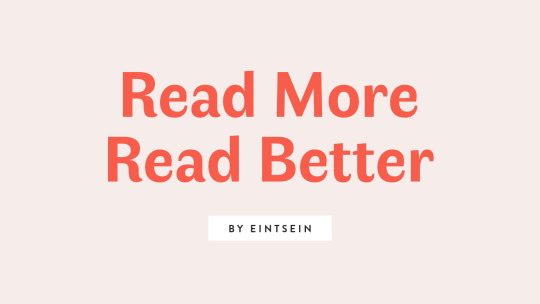

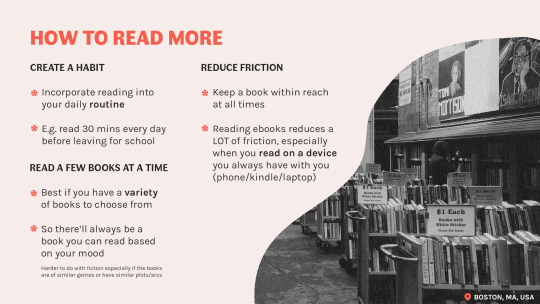
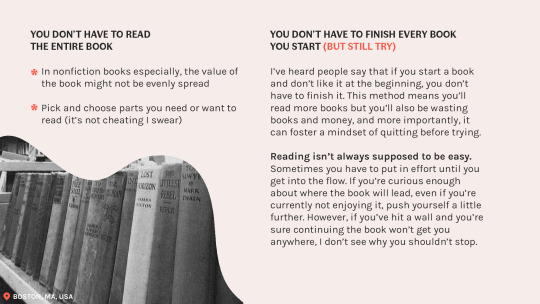
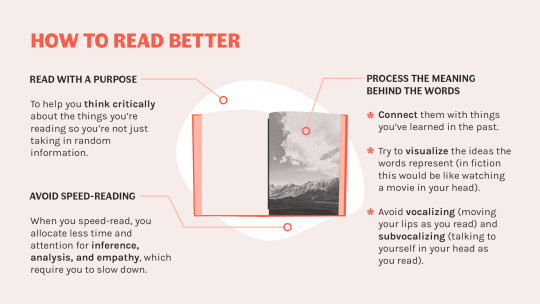
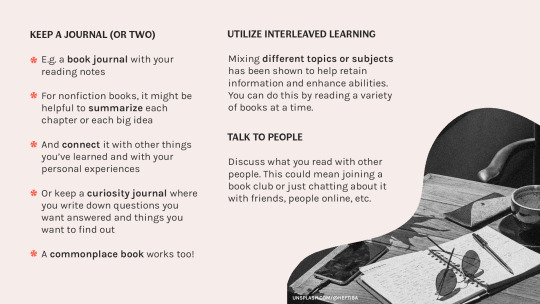
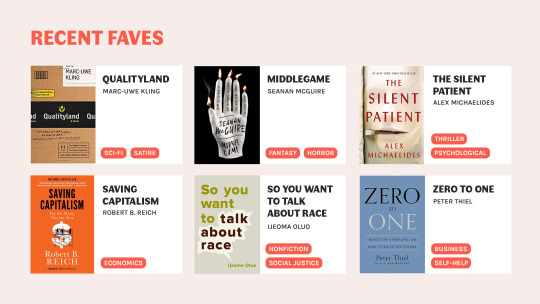

Read More, Read Better
Many of us are looking for more ways to enjoy our time at home in these stressful circumstances. Some of us have turned to books. But how can we make sure we get the most out of them?
Keep reading
24K notes
·
View notes
Text

here’s some fun AP Biology notes from this week ! i’m super proud of them :)))
0 notes
Text
i converted to digital notes ! it’s a lot more efficient, and so far i’m super happy with it :) hopefully i’ll be posting more
0 notes
Photo



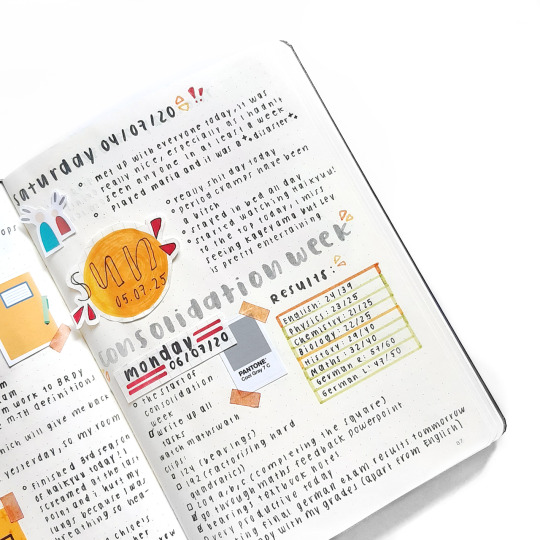
07/07/20
the first week of my new spread ✅ ft. the sky
also peek my results from the exams in the bottom right photo, apart from english and history, i did really well! although lets not forget they were also open book exams but
561 notes
·
View notes
Photo
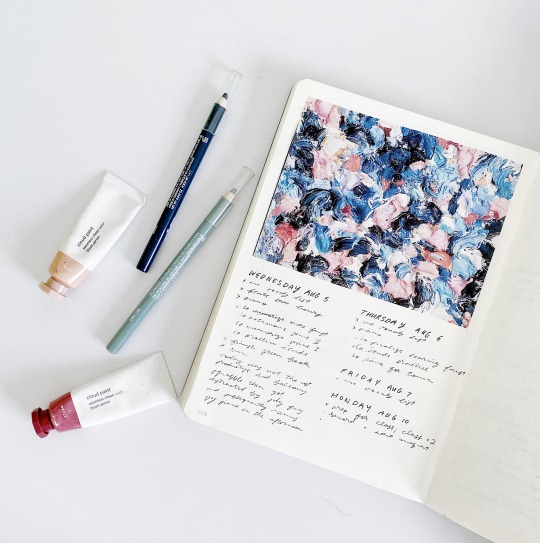
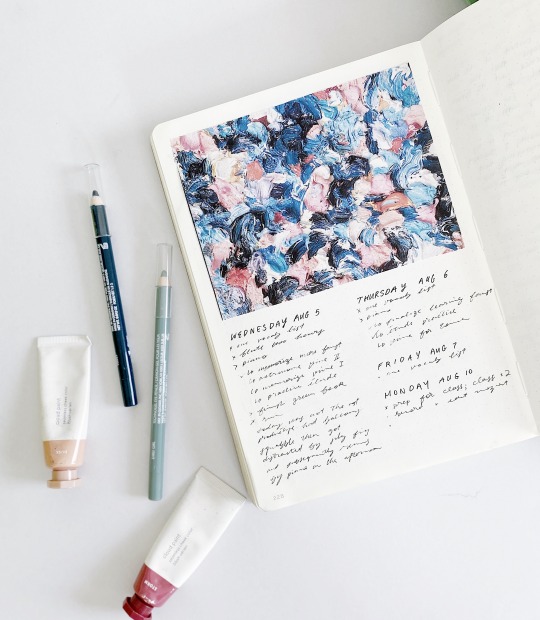
08/14/2020; summer studying challenge
what is your favourite summer clothing?
anything green!!! that’s all i wore last summer, but this year is an assortment of t-shirts and pajama shorts (& brow gel!) for the zoom camera :)
616 notes
·
View notes
Photo
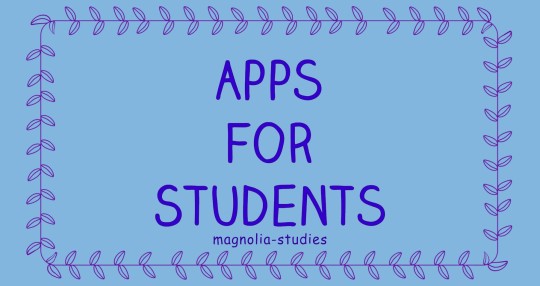
Saturday, July 22nd, 2017
Here are some of the very best apps for students; either in highschool or in college. I have used many of the following apps, but not all of them. Some, I have just asked friends about and they suggested those ones.
Please enjoy the apps below, tell me how you like them, and feel free to add onto this list :)
Focus: SelfControl, Forest, MindNode, FocusBooster, FocusWriter, Think, StayFocused, Freedom, Cold Turkey, Anti-Social, Time Out, SmartBreak, Balanced
Productivity: Evernote, Any.do, MyScript Nebo, Outlook, Trello, Droptask, Basecamp, Pocket, Gyst, Doodle, Pen and Paper, Wunderlist, Toggl, Asana, Wolfram Alpha
Sounds: Tide, WhiteNoise, Chroma Doze, Coffitivity, Noisli, Brain.fm, NatureSpace, Noizio, Rainy Mood, SimplyNoise, Spotify, Slacker Radio
Language Learning: Duolingo, Memrise, Busuu, Babbel, Livemocha, Living Language, Tandem, MindSnacks
Games: Lumosity, Sudoku, TanZen, GeoMaster Plus HD, Speed Anatomy, Star Walk, LeafSnap, Splice: Tree of Life, Vismory, Pigments, Viridi, Sunshine, Nota
Revision: Gojimo, Revision App, iMindMap, Exam Countdown, Penultimate, Clippet
Test Prep: Khan Academy, Magoosh ACT Flashcards, The Grading Game, Math Brain Booster, ACCUPLACER Study App, CK-12, NRICH, StudySync, Quizlet, StudyAce, That Quiz, Brilliant, Synap
Planner: Timeful, Remember the Milk, Listastic, Finish, 2Do, iStudiez Pro, MyHomework Student Planner, My Study Life, ClassManager, MyLifeOrganized, Daily Agenda, Schedule Planner, Todoist
Writing: EasyBib, ProWritingAid, Bubbl.us, WiseMapping, yWriter5, Storybook, Q10, Write 2 Lite, Writer, Diaro, Note Everything, OmmWriter, Draft
Health: MyFitnessPal, Lose It, Endomondo, FitNet, Sworkit, Daily Yoga, Yonder, Fooducate, SideChef, Rise, LifeSum, Meditation Studio, Happify, 7 Cups, Clue, Start, Power Nap App, Fit Radio, Calm
Courses: Corsera, PhotoMath, Udemy, HowCast, SimpleMind+, Open Culture, Canvas, Schoology, Alison, CourseBuffet, Degreed, Instructables, InstaNerd, Big Think, Yousician, Pianu
Books & Reading: CampusBooks, Scribd, Pocket, Wattpad, GoodReads, Readmill, Audible, Prizmo, Blio, Kindle, Overdrive, BlueFire Reader, Nook, Kobo, Aldiko, Cool Reader
Note Taking: SuperNotes, StudyBlue, Bento, QuickOffice, Google Keep, Zoho Notebook, Simplenote, Bear, OneNote, Box Notes, Dynalist.io, Squid, Notability
Inspiration: TED, Lift, Believe It: You Will Achieve, BrainCourage, Get Inspired, iFundamentals, Reinventing Yourself, iWish, Pozify, Positive Thinking - The Key to Happiness, The Gratitude Journal
Other: WiFi Finder, Mint, Zwoor, Brain Pump, Curiosity, Ready4 SAT, GradeProof, edX, Mendeley, Due, CamScanner, IFTTT, Square Cash
29K notes
·
View notes
Photo
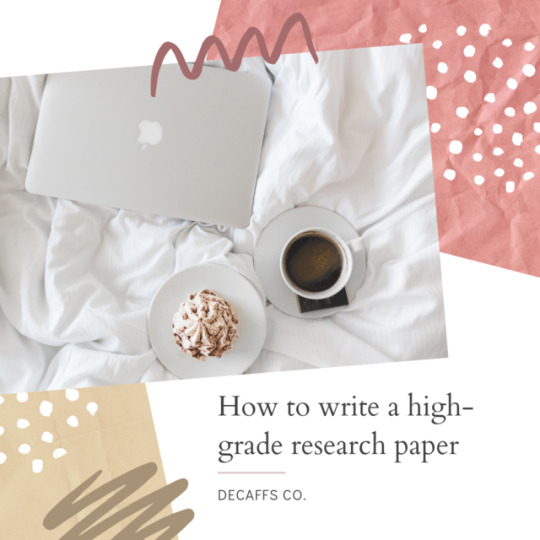
HOW TO WRITE A HIGH-GRADE RESEARCH PAPER
~~~~~~~~~~~~~~~~~~~~~~~~~~~~~~~~~~~~~~~~~~
The first time I had to write a research paper for university was one of the most stressful experiences I’d ever had - it was so different to anything I’d ever done before and caused me so much anxiety! It turned out that I’m pretty damn good at writing research reports and I’m now looking to pursue a career in psychological research.
I have never received less than a First (or 4.0 GPA for you American studiers) in my research papers so I thought I’d share my top tips on how to write a kick-ass, high-grade research paper.
*disclaimer: I am a psychology student, my tips are based on my personal experience of writing up psychological research (quantitative and qualitative); therefore, they may require some adaptation in order to be applied to your field of study/research*
These tips will be split up into the different sections a research paper should consist of: abstract, introduction, methods, results, discussion.
ABSTRACT
The aim of an abstract is to summarise your whole paper - it should be concise, include key-words, highlight the key points of your paper and be written last.
When I say concise, I mean concise! The abstract is what other students and researchers will read in order to decide whether your research is relevant their own work and essentially determines whether or not they’ll read on - they want to know the key details and don’t want to be overwhelmed with information.
I always aim to keep my abstracts under 250 words. I set myself this limit to stop myself waffling and dwelling on unimportant points, it helps me to be really selective of what I include and ensures I’m gripping the reader from the start.
Your abstract should discuss the research rationale, the methods and designs used, your results and the general conclusion(s) drawn. One or two sentences on each of these topics is enough.
Make sure you’re using key-words throughout your abstract as this will also help the reader decide whether your work is relevant to theirs. You can make key-words super obvious by highlighting them in a key at the bottom of your abstract (see below) or just used jargon consistently. Using key-words is also important if you’re looking to get your work published, these words will help people find your work using search engines.

Finally, write your abstract last! An abstract is a summary of your whole research paper which makes it practically impossible to write well first. After writing the rest of your paper, you will know your research inside and out and already have an idea of what key things you need to highlight in your abstract.
INTRODUCTION
For me, the introduction section is always the most intimidating to write because it’s like painting on a blank canvas - massively daunting and leaving you terrified to make a mistake!
The aim of an introduction is to provide the rationale for your research and justify why your work is essential in the field. In general, your introduction should start very broad and narrow down until you arrive at the niche that is your research question or hypothesis.
To start, you need to provide the reader with some background information and context. You should discuss the general principle of your paper and include some key pieces of research (or theoretical frameworks if relevant) that helps your reader get up to speed with the research field and where understanding currently lies. This section can be pretty lengthy, especially in psychological research, so make sure all of the information you’re including is vital as it can be pretty easy to get carried away.
This background should lead you onto the rationale. If you’ve never written a research paper before, the rationale is essentially the reason behind your own research. This could be building on previous findings so our understanding remains up to date, it could be picking up on weaknesses of other research and rectifying these issues or it could be delving into an unexplored aspect of the field! You should clearly state your rationale and this helps lead into the next section.
You should end your introduction by briefly discussing your current research. You need to state your research question or hypothesis, how you plan on investigating the question/hypothesis, the sample you plan on using and the analysis you plan to carry out. You should also mention any limitations you anticipate to crop up so you can address these in your discussion.
In psychology, references are huge in research introductions so it is important to use an accurate (and modern as possible) reference for each statement you are making. You can then use these same references in your discussion to show where your research fits into the current understanding of the topic!
METHODS
Your methods section should make use of subheadings and tables where necessary and should be written in past tense. This can make the (potentially) lengthy section easier to navigate for the reader. I usually use the following headings: participants, materials, design, procedure.
The participants section should describe the sample that took part in your research. Age, gender, nationality and other relevant demographic information should be provided as well as the sampling technique. Personally, I use a table (see below) alongside my continuous prose as an alternative way of viewing my sample population. Please note, if you’re using a table make sure it adheres to your university guidelines.
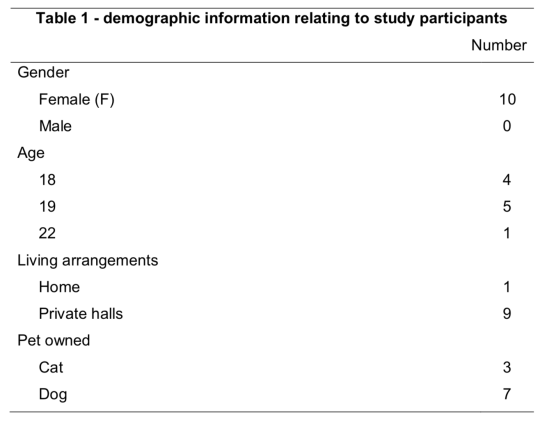
The materials section of your methods should include any equipment, resources (i.e. images, books, diagrams) or any other materials used in your data collection. You should also reference the program that helped you conduct your analysis. For example, if you are writing a qualitative research paper, you may want to include Microsoft Word in your materials if you use the program to transcribe interviews.
You should then describe the design used in your research. All variables should be identified in this paragraph, if relevant. You should also discuss whether your research is within-groups or between-groups, again only if relevant.
Last is your procedure section - the most important one! You must write this section with enough detail so that anybody could pick it up, read it and conduct the same experiment with ease. You should describe what participants were required to do, how data was collected and it should be written in chronological order! While it’s important to provide enough information, try not to overwhelm the reader with lengthy sentences and unnecessary information.
RESULTS
Your results section’s sole purpose is to provide the reader with the data from your study. It should be the second shortest section (abstract being first) in your research paper and should stick to the relevant guidelines in regards to reporting figures, tables and diagrams. Your goal is to relay results in the most objective and concise way possible.
Your results section serves to act as evidence for the claims you’ll go on to make during your discussion but you must not be biased in the results you report. You should report enough data to sufficiently justify your conclusions but must also include data that doesn’t support your original hypothesis or research question.
Reporting data is most easily done through tables and figures as they’re easy to look at and select relevant information. If you’re using tables and figures you should always make sure you’re stating effect sizes and p values and to a consistent decimal place. Illustrative tables and figures should always be followed by supporting summary text consisting of a couple of sentences relaying the key statistical findings in continuous prose.
DISCUSSION
The discussion section should take the opposite approach to your introduction! You should start discussing your own research and broaden the discussion until you’re talking about the general research field.
You should start by stating the major findings of your study and relating them back to your hypothesis or research questions. You must must must explicitly state whether you reject or accept your experimental hypothesis, if you have one. After stating your key findings you should explain the meaning, why they’re important and where they fit into the existing literature. It’s here that you should bring back the research you discussed in your introduction, you should relate your findings to the current understanding and state the new insight your research provides.
You should then state the clinical relevance of your research. Think about how your findings could be applied to real-life situations and discuss one or two practical applications.
After this, discuss the limitations of your research. Limitations could include sample size and general sample population and how this effects generalisability of findings, it could include methodological problems or research bias! These limitations will allow you to discuss how further research should be conducted. Suggest ways in which these limitations could be rectified in future research and also discuss the implications this could have on findings and conclusions drawn.
Finally, you need to give the reader a take-home message. A sentence or two to justify (again) the need for your research and how it contributes to current understanding in the field. This is the last thing your audience will read so make it punchy!
~~~~~~~~~~~~~~~~~~~~~~~~~~~~~~~~~~~~
That’s it folks! My tips for writing a kick-ass, high-grade research paper based on my personal experience. If you have any questions regarding things I’ve missed or didn’t provide enough detail of, then please just send me an ask!
Also, if any of you would like to read any of my past research papers I would be more than happy to provide you with them :-))
7K notes
·
View notes
Text
types of study breaks for every situation
if you realize you’ve been studying for hours: grab a snack to refuel your body and watch a sitcom to refuel your brain. then back to the books.
if you’re feeling stressed out: take some deep breaths, text your friends, maybe stare at a wall for a few minutes. gather yourself.
if you can’t seem to focus: get moving and get outside. take out the garbage, check your mail box, maybe walk your dog. just get moving and get fresh air. it’ll help bring you back.
if there’s something else going on in your life and you can’t get it off your mind: write down what’s going through your head, sort of like a diary entry. it’ll help you work things out.
if you’re just mentally and physically exhausted: set a timer for 25-30 minutes and take a nap. any longer and you’ll hit REM and you’ll wake up feeling just as tired. once you wake up, get some caffeine in you.
if the material is boring as hell: find another way to study. see if there’s a crash course video online about it or draw out what you’re trying to learn in diagrams and pictures to make it fun.
if people around you won’t shut up: listen to some music. soundtrack and classical music is always good because they won’t absorb you as much as music with lyrics. white noise (like ocean waves, rain sounds, etc.) also works.
if you only half understand a concept: call/message a friend who’s not in the class and try to teach the material to them. this will help you mentally work through the material and will help you remember it as well.
93K notes
·
View notes






